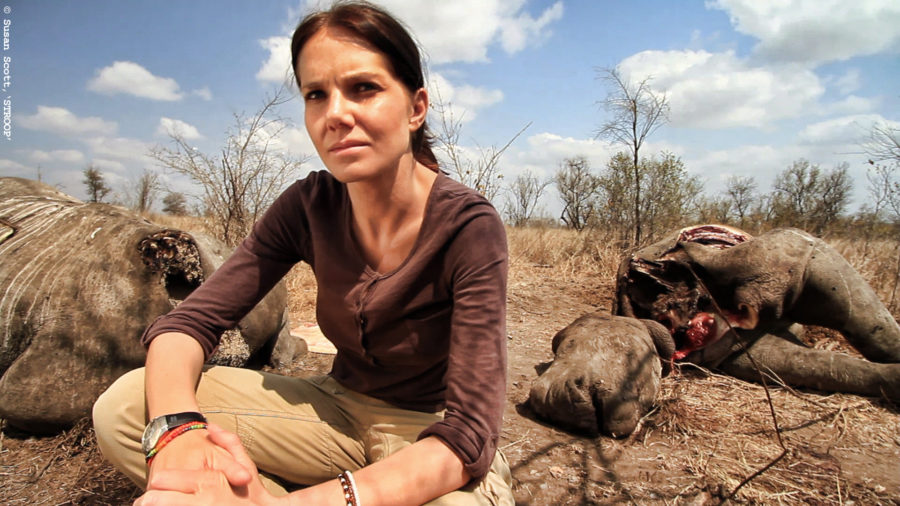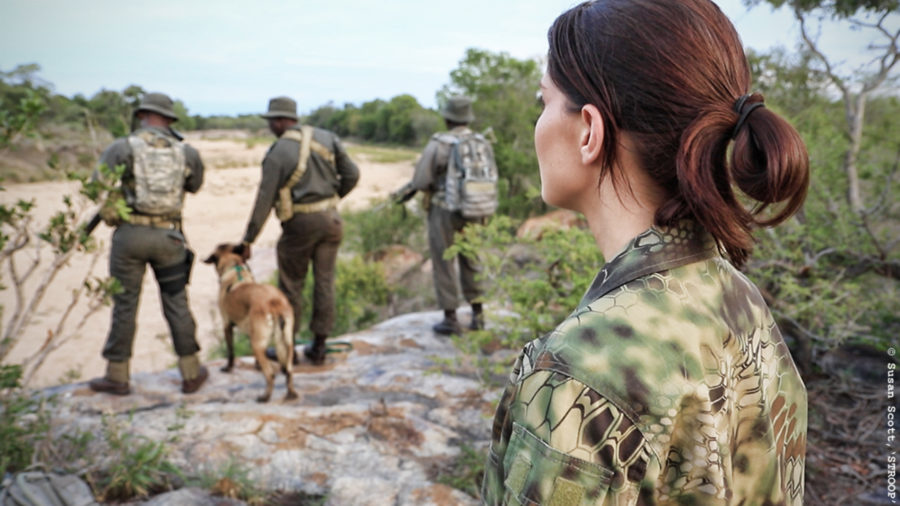21st September 2018
World Rhino Day – Journey into the Rhino Horn War

The South African duo who risked EVERYTHING to film the illegal trade in rhino horn in Africa and Asia
South African filmmakers Susan Scott and Bonne de Bod sold their homes and moved back in with their parents to undertake a dangerous three-year-long investigation into the murky underground world of the illegal trade in rhino horn. Seedy backyard shops, impoverished South African poachers and well-oiled legal teams: what they uncovered shocked them to the core. Their film “STROOP: Journey into the Rhino Horn War” will have its European premiere at the Wildlife Film Festival in Rotterdam in October.
We were absolutely shocked by the scale of what we found. It is hard to form a picture in your mind when you hear three rhinos are killed every day for their horn. That’s quite a thing to actually take in. Every eight hours, a rhino is killed. So by the time you go to sleep tonight and wake up tomorrow morning, a rhino will be dead for no reason other than the horn it carries on its face. You go to work and sometime after your lunch break another one. And when you head home for supper, poachers are on the tracks of a third rhino. So before your head hits the pillow again, there will be one more rhino gone forever. Every single day, three rhinos are lost to our planet. Gone forever.
Hundreds of rhino poachers in the dock
Rhinos numbered a million at the turn of the last century. Now only 29,000 remain. When you try to quantify that amount, it’s staggering. But that’s our job as filmmakers: to take difficult-to-comprehend stuff and give it relevance. Of course seeing the slaughter when you visit crime scenes and see carcass after carcass is visceral. You see it and it’s awful and you certainly smell it. But it’s the amount of horn out there that is actually quite hard to get across. Even in the back streets of Asia where we found rhino horn, it’s a rare and expensive commodity. The traders know it’s illegal so you don’t see the scale of the slaughter in terms of the physical commodity or dead animals. But you do see it when you attend court in the Kruger National Park and surrounding areas. In our time filming the judicial system, we saw hundreds of rhino poachers in the dock. And the prosecutors and rangers always reminded us that there were thousands of men outside the park literally waiting to step into [the poachers’] shoes.
Car shock absorbers
The lowest point for me during the filming was attending rehabber Karen Trendler’s second orphan workshop in 2016. The first was in 2015. The change in just a year in the brutality and cruelty the poachers had shown overwhelmed me. For Bonné it was the cruelty done to rhinos. She cannot understand how a living soul capable of feeling his or her own grief and hurt can do deep trauma to a rhino. We’re talking about poachers only shooting one shot with a crude silencer somewhere into a rhino’s neck or knee because a car shock absorber, which is what poachers use now to muffle the sound, obscures the rifle sights. So a brain shot is no longer taken. Then the poachers hack at the rhino’s spine with an axe while the injured rhino is running away from or towards them. All the while the rhino is screaming. Many rangers have told us that this is what has alerted them on their patrols.
Illegal traders ‘just scraping by’
The illegal trading we saw was surprisingly unglamorous. The back rooms behind shops fronting as wood carving trinket stores, are seedy. The illegal ivory carvers and rhino horn bangle makers are poor. Just like the poachers in Kruger who are impoverished, the first layer of illegal traders in Asia are just scraping by. We never saw the massive wealth that everyone talks about. We speculate that it’s at much higher levels. That is of course what trans-national organized crime is all about. The syndicate leaders don’t get their hands dirty and are never around.
State prosecutors ‘work so hard’

Government enforcement officials and wildlife crime investigators always say that syndicates evolve, adapt and are one step ahead. That’s true, not least because legal methods of tackling them appear to be inefficient. In our four years of filming, we spent time following state prosecutors. They work so hard to make antiquated laws stick in trial. They battle well-paid defence teams who are skilled at getting their clients out on bail on legal technicalities. Syndicate trials in South Africa are delayed for year. Despite a plethora of charges on the accused, they are out on bail while awaiting trial. That means they are back in the business of collecting rhino horns so they can pay their legal teams.
Hope in a devastating situation
We’ve been at the airport when traffickers have been arrested carrying millions of dollars’ worth of rhino horns. They now know to plead guilty because they get off on a R500,000 fine (35,000 US). That is not a justice system that is working for our rhinos.
I do believe that however hard parts of the film may be to watch, the central message is that there can be hope in this devastating situation. The characters in the film never stop believing that things will change.

This piece just opened my eyes on this issue of illegal trade in rhino horn in Africa…. So sad